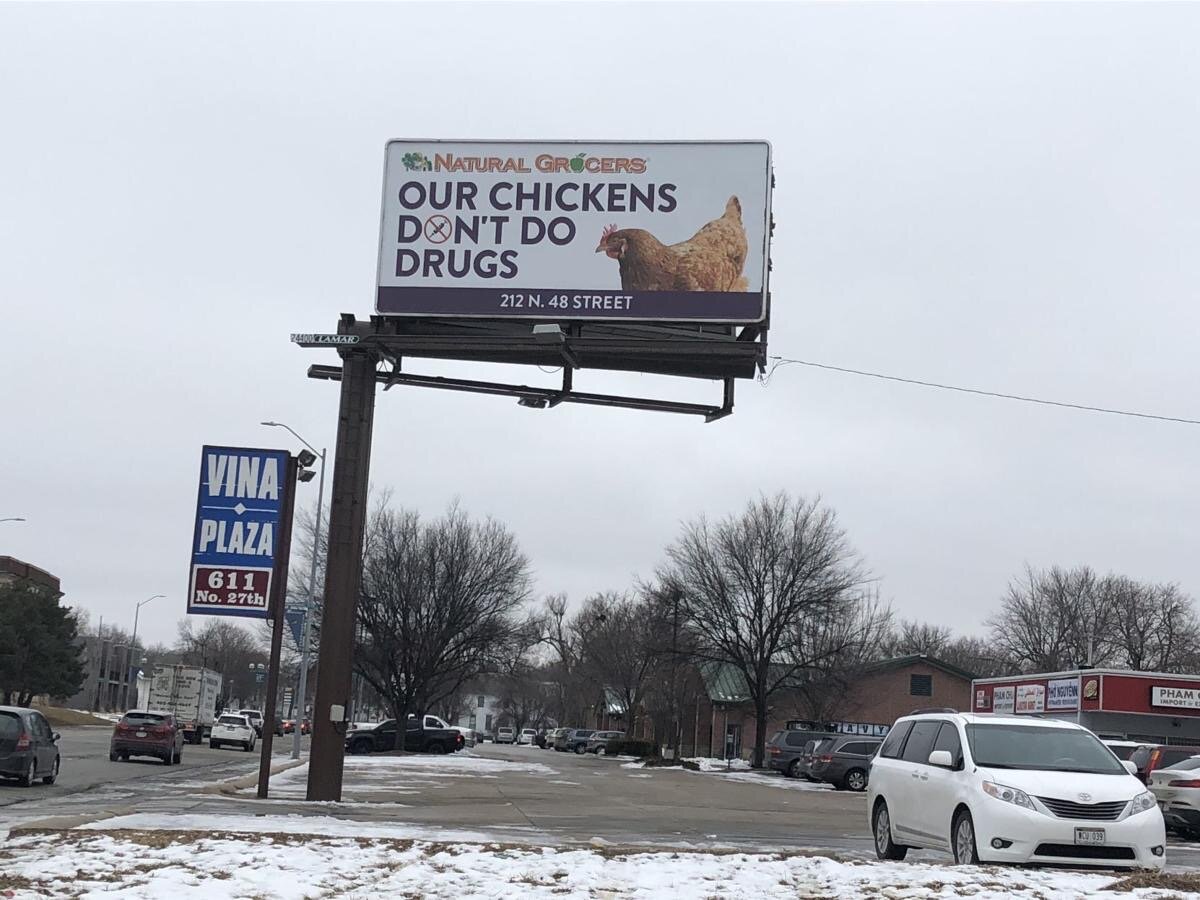“I’m too [uninformed] to taste this chicken.”
This week instead of writing my column traditionally (finding something interesting and typing it on my computer), I chose to use a dictation app on my phone so I wouldn’t lose my thoughts while driving. On my way home from Denver this past weekend, I saw a billboard from the Natural Grocers company which read “Our chickens don’t do drugs.” When I saw this billboard, I immediately exited the interstate and downloaded a dictation app.
This is not a photo of the actual billboard I saw, this was gathered online from the Lincoln Journal Star in Lincoln, Nebraska — this means this billboard is plastered all across the United States in order to influence consumers.
“Our chickens don’t do drugs.”
This statement proves to be confusing to consumers across the country. According to a 2015 study from the National Chicken Council, nearly 80 percent of Americans believe chicken contains added hormones and steroids, “when in fact, no chicken sold or raised in the U.S. is given hormones or steroids,” the report stated.
In this 2015 study, the National Chicken Council said that in some cases, consumers aren’t able to easily access facts on chicken production. At the time, this may have been true. But five years later, in 2020, if you google “does chicken contain hormones and steroids,” you are provided with an abundance of resources claiming that they don’t.
So, why is it that in the year 2020, we’re seeing billboards claiming otherwise? And why is Natural Grocers legally allowed to publish this on multiple billboards across the country?
On the Natural Grocers website, the company claims their meat is free of “Hormones and other synthetic growth promotants, such as arsenicals or beta-agonists drugs like Ractopamine.”
This statement is not a lie, it’s the truth just like their billboard… but it’s not just the truth for Natural Grocers, it’s the truth for every grocery store across the country. Natural Grocers uses this marketing tactic of making the consumer THINK other grocery stores sell meat which contains hormones and other drugs. And, you know, it’s not a bad plan: they’re not breaking any laws and they’re clearly maintaining a solid customer base while getting a leg up on the competition.
The problem is, however, that consumers see these billboards and just assume that other grocery stores sell meat which DOES contain these drugs.
This billboard made me realize exactly why I do what I do and why I love writing this column so much. I’ll bring up the bell curve I’ve mentioned before: about 70 percent of Americans don’t know much about the agricultural industry. Maybe they know a little, but they don’t know enough to decipher what’s fact and fiction. And the sad fact is, we do a poor job at marketing agriculture to this group of people — we are not transparent with our agricultural practices.
Don’t get me wrong, several organizations have stepped up their game to market ag to the Moveable Middle over the past few years, but it’s not enough. We simply have to do better because I’m here to tell y’all, “transparency” is not just a buzzword you’ll hear at your summer meetings, it’s a word you need to remember for the rest of your life because people want to know where their food comes from and that will not change.
If you are a consumer,
don’t pay more for some chicken that’s marketed to be “healthier” than the others. There are government agencies such as the Food Safety Inspection Service and the USDA which create and enforce guidelines to ensure your food is safe when it’s placed in your grocery bags. Educate yourself, don’t believe everything you read on the internet. Heck, even fact check this column.
If you are a rancher or farmer,
I encourage you to share your operation’s story on social media. I encourage you to share ag facts on Facebook from organizations like the Beef Checkoff, the National Chicken Council, and the National Pork Board. Follow people like the Farm Babe and Derrick Josi and send their posts to your friends. You may not have the time to get out there and advocate for agriculture like the ag communicators do, but if you’re scrolling through social media anyway, you might as well be productive with it.
If you are an ag communicator or marketer,
keep up the good fight. Consumer awareness and agricultural transparency will not happen just because you shared one post on Facebook and it’s not going to happen overnight either. Keep posting on Instagram, keep retweeting, keep sharing Facebook posts, and warmly welcome questions from those who are uneducated. Fight for the industry that feeds you because if you don’t, no one else will.


